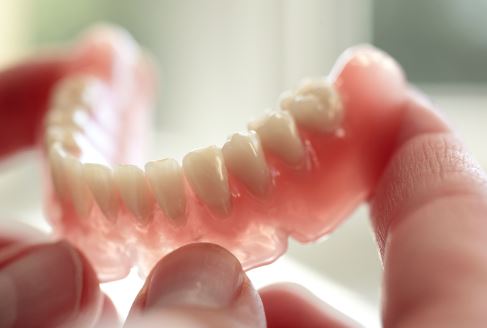
If you are one of the millions of people having missing teeth worldwide, you can readily realize the importance of having teeth replacement to improve your ability to speak audibly, eat comfortably, and smile confidently. Restorative dentistry provides many teeth replacement methods, such as dentures or implant-supported dentures. Modern oral health technology and research in implant dentistry enable the people who lose teeth to wear artificial teeth and enjoy natural-like bites and smiles.
What are Dentures?
Dentures are detachable synthetic teeth that look like natural teeth. Your dentist can recommend either the complete dentures or partial dentures to fill the gaps left by the missing tooth.
• Complete dentures fill the entire arch and suit the patients who have all the teeth missing. The restorative dentist will ensure that the complete denture is comfortable and fitting.
• Partial dentures fit the people who have some natural teeth remaining. Partial dentures have twin benefits-filling the gaps left by the missing teeth and preventing the intact teeth from being loose or shifting.
Dentures can last many years although there is need to remake, repair, and readjust the artificial teeth as per the dentist’s advice because of wear and tear. As dentures appear similar to your natural teeth, your friends and workmates can never realize that you have synthetic teeth.
Who can wear Dentures?
Many people talk about dentures as false teeth possibly because of receiving the wrong information. It is also not right that dentures suit only the senior citizens. Dentures are appropriate for all age groups as long as the patient wishes to reclaim the natural facial appearance, normal speech, full smile, and enjoy eating with a complete set of teeth.
The Custom-Made Prosthetic Teeth
As custom-crafted oral health features, your dentist will color-match the dentures to the remaining teeth. Dentures will not only improve your facial aesthetics, but they can also aid in pronunciation. When you visit clinics like Matthew Gerald, D.D.S., a Woodbridge dentist, for teeth replacement, the restorative dentistry professional can determine the right dentures for you. First, the oral health expert will explain the available denture options as well as the ideal synthetic choice for you. For instance, you can choose between the implant-retained dentures and the conventional dental implants.
Rebuilding Smiles with Dentures
Whether you have missing teeth after an extraction, sports injury, slip, and fall, or road accident, you can wear dentures and start smiling naturally again. The implant-supported prosthetics provide you the opportunity to live as though no damage ever happened to your teeth. For the people whose teeth came off because of old age or dental cavities, quality restorative dentistry can reverse the losses to your satisfaction.
Benefits of Secured Dentures
Your restorative dentistry consultant understands that the prosthetic teeth can slip when you eat or speak. The shift happens because of the changes in your gums over the years. The adjustments of the dentures at your restorative dental clinic ensures your comfort always. In the initial stages of wearing the synthetic teeth, you can experience self-consciousness when speaking or eating. The discomfort you feel when wearing the prosthetic teeth disappears after a couple of days.
The permanent implant dentures, which the restorative dentist affixes to miniature titanium posts and places within the jaw bone and gum, is the surest way to ensure your artificial teeth do not shift. The implants help to strengthen and hold the dentures firmly. When your dentist prescribes dentures, you can start eating any food, speak, or smile without worries. Wearing dentures also restores your self-esteem as you do not feel ashamed of your image anymore.

